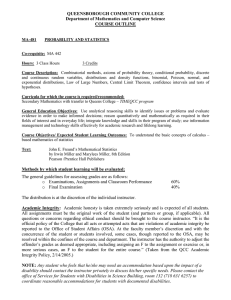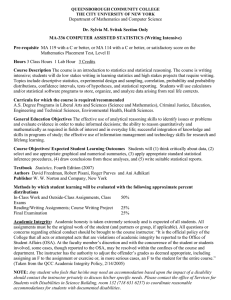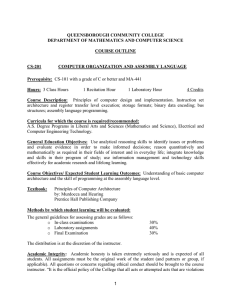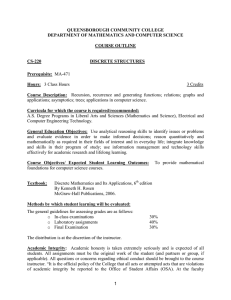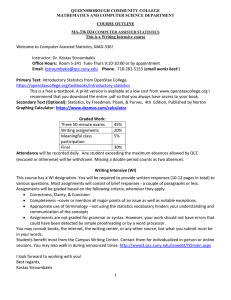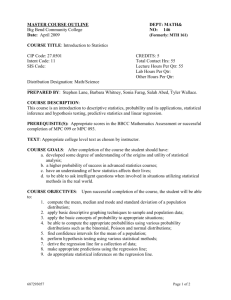QUEENSBOROUGH COMMUNITY COLLEGE DEPARTMENT OF MATHEMATICS AND COMPUTER SCIENCE COURSE OUTLINE
advertisement
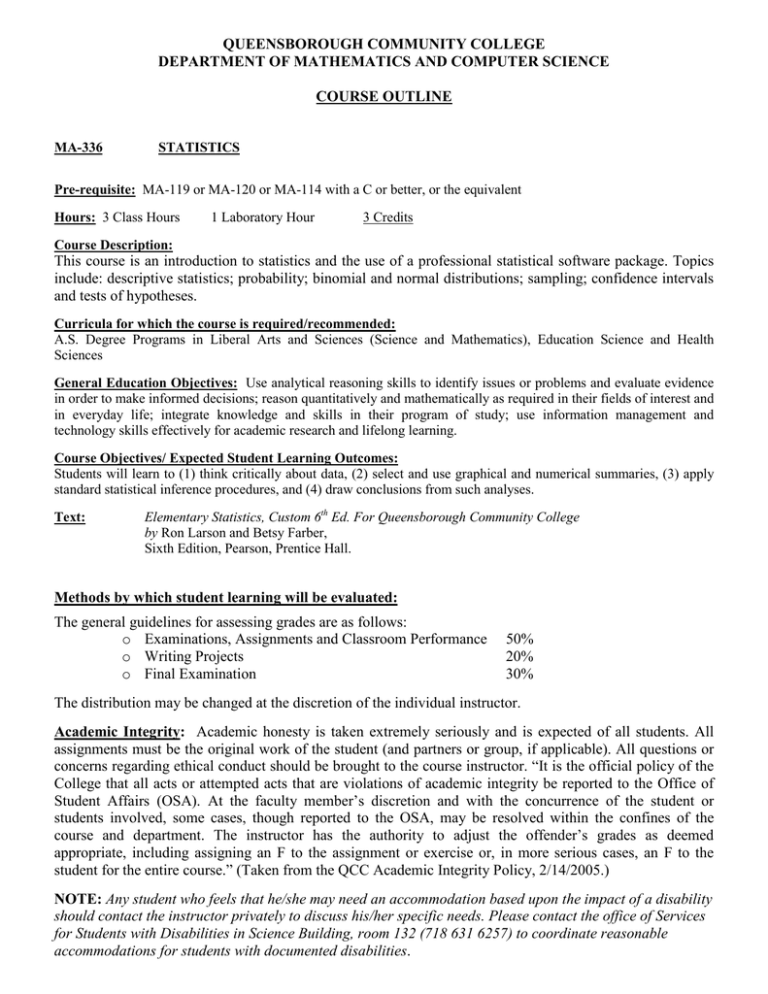
QUEENSBOROUGH COMMUNITY COLLEGE DEPARTMENT OF MATHEMATICS AND COMPUTER SCIENCE COURSE OUTLINE MA-336 STATISTICS Pre-requisite: MA-119 or MA-120 or MA-114 with a C or better, or the equivalent Hours: 3 Class Hours 1 Laboratory Hour 3 Credits Course Description: This course is an introduction to statistics and the use of a professional statistical software package. Topics include: descriptive statistics; probability; binomial and normal distributions; sampling; confidence intervals and tests of hypotheses. Curricula for which the course is required/recommended: A.S. Degree Programs in Liberal Arts and Sciences (Science and Mathematics), Education Science and Health Sciences General Education Objectives: Use analytical reasoning skills to identify issues or problems and evaluate evidence in order to make informed decisions; reason quantitatively and mathematically as required in their fields of interest and in everyday life; integrate knowledge and skills in their program of study; use information management and technology skills effectively for academic research and lifelong learning. Course Objectives/ Expected Student Learning Outcomes: Students will learn to (1) think critically about data, (2) select and use graphical and numerical summaries, (3) apply standard statistical inference procedures, and (4) draw conclusions from such analyses. Text: Elementary Statistics, Custom 6th Ed. For Queensborough Community College by Ron Larson and Betsy Farber, Sixth Edition, Pearson, Prentice Hall. Methods by which student learning will be evaluated: The general guidelines for assessing grades are as follows: o Examinations, Assignments and Classroom Performance o Writing Projects o Final Examination 50% 20% 30% The distribution may be changed at the discretion of the individual instructor. Academic Integrity: Academic honesty is taken extremely seriously and is expected of all students. All assignments must be the original work of the student (and partners or group, if applicable). All questions or concerns regarding ethical conduct should be brought to the course instructor. “It is the official policy of the College that all acts or attempted acts that are violations of academic integrity be reported to the Office of Student Affairs (OSA). At the faculty member’s discretion and with the concurrence of the student or students involved, some cases, though reported to the OSA, may be resolved within the confines of the course and department. The instructor has the authority to adjust the offender’s grades as deemed appropriate, including assigning an F to the assignment or exercise or, in more serious cases, an F to the student for the entire course.” (Taken from the QCC Academic Integrity Policy, 2/14/2005.) NOTE: Any student who feels that he/she may need an accommodation based upon the impact of a disability should contact the instructor privately to discuss his/her specific needs. Please contact the office of Services for Students with Disabilities in Science Building, room 132 (718 631 6257) to coordinate reasonable accommodations for students with documented disabilities. TOPICS CHAPTER PART I: DESCRIPTIVE STATISTICS AND EXPLORING DATA 1. Presenting Variables and Distributions: Data Classification; HOURS CLASS LAB 1 3 1 2. Descriptive Statistics: Graphical Display; Numerical Description 2 4 2 3. Correlation and Regression: Scatter-plots and Finding Correlation Coefficient; Linear Regression 9 4 1 Instructor’s notes 2 5. Probability: Basic Concepts; Conditional Probability and Multiplication Rule; The Addition Rule; Additional Topics in Probability and Counting 3 4 1 6. Discrete Probability Distributions: Probability Distributions; Binomial Distributions 4 4 1 7. Normal Probability Distributions: Introduction; Finding Probabilities and Values; Central Limit Theorem; Normal Approximation to Binomial Distribution 5 5 2 2 1 Data Collection; Experimental Design 4. How to write a statistical report PART II: FROM EXPLORATION TO PROBABILITY 8. First writing project. PART III: STATISTICAL INFERENCE ABOUT VARIABLE 9. Confidence Intervals for the Mean: Large and Small Samples 6 5 2 10. Hypothesis Testing for the Mean: Introduction and using Large and Small Samples 7 5 2 12 Second writing project 2 1 13. REVIEWS, EXAMS INCLUDING FINAL EXAM 5 1 45 15 Total The approximate hours per chapter are guidelines and are at the discretion of the instructor. The instructor is responsible for making assignments and scheduling examinations. ED:cs FALL 2014
